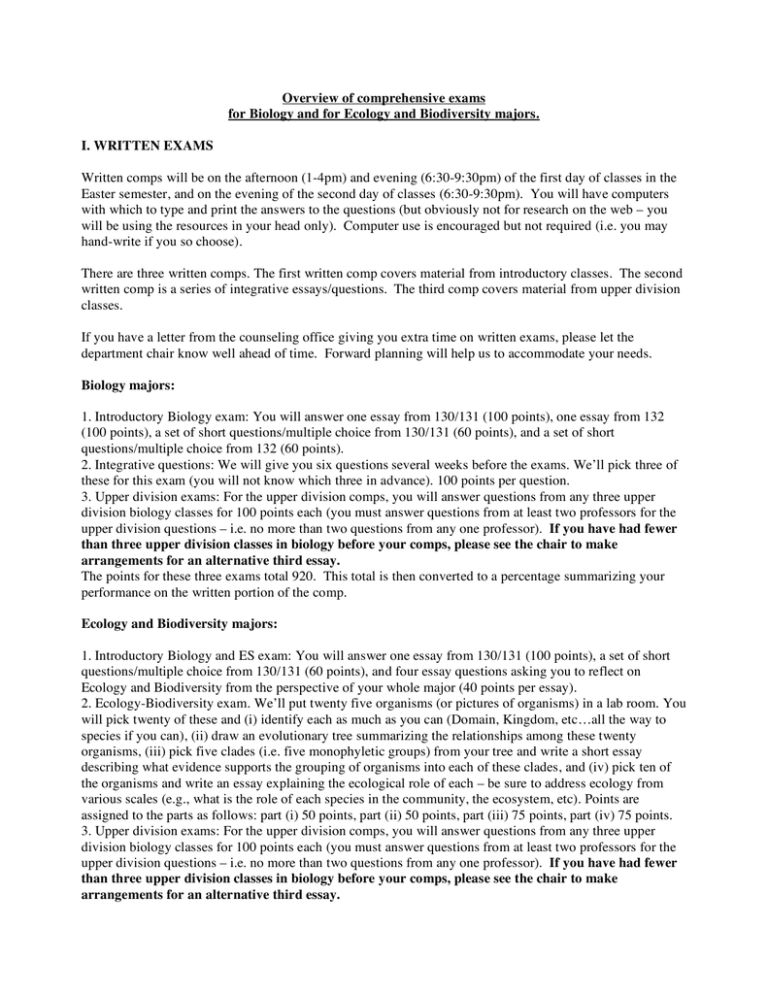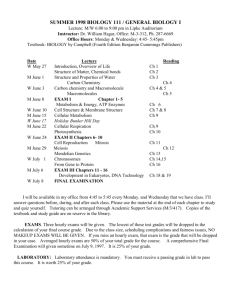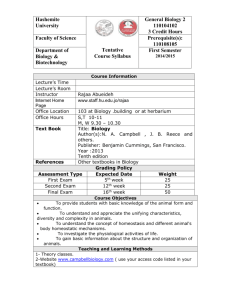Overview of comprehensive exams I. WRITTEN EXAMS
advertisement

Overview of comprehensive exams for Biology and for Ecology and Biodiversity majors. I. WRITTEN EXAMS Written comps will be on the afternoon (1-4pm) and evening (6:30-9:30pm) of the first day of classes in the Easter semester, and on the evening of the second day of classes (6:30-9:30pm). You will have computers with which to type and print the answers to the questions (but obviously not for research on the web – you will be using the resources in your head only). Computer use is encouraged but not required (i.e. you may hand-write if you so choose). There are three written comps. The first written comp covers material from introductory classes. The second written comp is a series of integrative essays/questions. The third comp covers material from upper division classes. If you have a letter from the counseling office giving you extra time on written exams, please let the department chair know well ahead of time. Forward planning will help us to accommodate your needs. Biology majors: 1. Introductory Biology exam: You will answer one essay from 130/131 (100 points), one essay from 132 (100 points), a set of short questions/multiple choice from 130/131 (60 points), and a set of short questions/multiple choice from 132 (60 points). 2. Integrative questions: We will give you six questions several weeks before the exams. We’ll pick three of these for this exam (you will not know which three in advance). 100 points per question. 3. Upper division exams: For the upper division comps, you will answer questions from any three upper division biology classes for 100 points each (you must answer questions from at least two professors for the upper division questions – i.e. no more than two questions from any one professor). If you have had fewer than three upper division classes in biology before your comps, please see the chair to make arrangements for an alternative third essay. The points for these three exams total 920. This total is then converted to a percentage summarizing your performance on the written portion of the comp. Ecology and Biodiversity majors: 1. Introductory Biology and ES exam: You will answer one essay from 130/131 (100 points), a set of short questions/multiple choice from 130/131 (60 points), and four essay questions asking you to reflect on Ecology and Biodiversity from the perspective of your whole major (40 points per essay). 2. Ecology-Biodiversity exam. We’ll put twenty five organisms (or pictures of organisms) in a lab room. You will pick twenty of these and (i) identify each as much as you can (Domain, Kingdom, etc…all the way to species if you can), (ii) draw an evolutionary tree summarizing the relationships among these twenty organisms, (iii) pick five clades (i.e. five monophyletic groups) from your tree and write a short essay describing what evidence supports the grouping of organisms into each of these clades, and (iv) pick ten of the organisms and write an essay explaining the ecological role of each – be sure to address ecology from various scales (e.g., what is the role of each species in the community, the ecosystem, etc). Points are assigned to the parts as follows: part (i) 50 points, part (ii) 50 points, part (iii) 75 points, part (iv) 75 points. 3. Upper division exams: For the upper division comps, you will answer questions from any three upper division biology classes for 100 points each (you must answer questions from at least two professors for the upper division questions – i.e. no more than two questions from any one professor). If you have had fewer than three upper division classes in biology before your comps, please see the chair to make arrangements for an alternative third essay. The points for these three exams total 870. This total is then converted to a percentage summarizing your performance on the written portion of the comp. II. GRADING FOR WRITTEN EXAMS: To pass your comps, you must pass ALL four written components. For bio majors these are: 131 exam, 132 exam, three integrative essays, and upper division exam. For eco-bio majors these are: 131 exam, ES/whole major exam, identification and essays on organisms, and upper division exam. If you do not receive a passing grade on one or more of the four, you will retake that component again in the second comping period (after spring break). The questions on the retake exam will be different from the first exam, but will cover the same areas of knowledge (e.g., 131 material if you fail the 131 exam). If you fail the upper division portion, you will retake exams in all three upper division classes which you chose to answer the first time through. If you obtain a sufficiently high grade (B+/A-) on the written exams, you will be invited to take an oral exam in the second week of classes to try for Distinction in comps. To get Distinction, the mean of the your written and oral grades must be in the A range. These oral comps will be 40 minutes long and will be given by a panel of four faculty members. For biology majors, the panel is drawn from across the range of biological disciplines (not necessarily faculty members from whom you have taken classes). For eco-biodiv majors, the panel is composed of faculty members whose classes cover the ecology/biodiversity material. At the start of each oral exam, you will be asked to pledge that you will not discuss the content of the exam once you leave the room, then you will list the upper division classes you have taken. Each faculty member assigns a grade out of 100, then these grades are averaged to give a percentage. You may invite up to two juniors (in your major) to observe your oral comp. The visitors will, of course, not participate in the comp. III. ADDITIONAL INFORMATION Samples of comp questions from previous years are available from http://www.sewanee.edu/biology/InfoForCurrentStudents.html under the link “sample comps” You need a 2.00 GPA in the major in order to comp (for Biology majors: “the major” = all biology classes taken at Sewanee; for Ecology/Biodiversity majors: “the major” = all biology and EnSt classes taken at Sewanee). If you do not have a 2.00, you should take more bio classes (or retake some) and when your GPA crosses the 2.00 mark, you will take the comprehensive exams. Please see the college catalog for details about substituting grades in classes which you retake. If you have extra-curricular commitments that will interfere with studying over the Christmas break, please make plans to study earlier in the fall. The comping periods are set by the college and we cannot grant exceptions or extensions, unless you have a bad medical problem or other serious crisis. One exception: if you are double-majoring and your other major also comps in January, we can make arrangements for you to comp in a different official comp period. Please contact the chair of biology to make these arrangements. You are expected to attend all your classes and labs the week of comps, unless you make other arrangements beforehand with your professors. There is no need to miss class, nor is missing class while comping a “right”, nor is skipping class a Sewanee tradition for seniors. The bio dept does not run labs during comp week, but other departments do, so be sure to contact your professors to make suitable arrangements. Contacting people after comps to get excused from work or attendance is not an acceptable practice.







